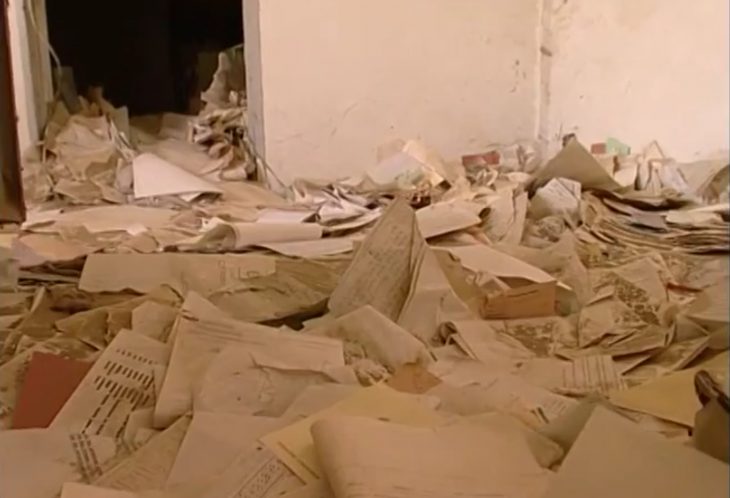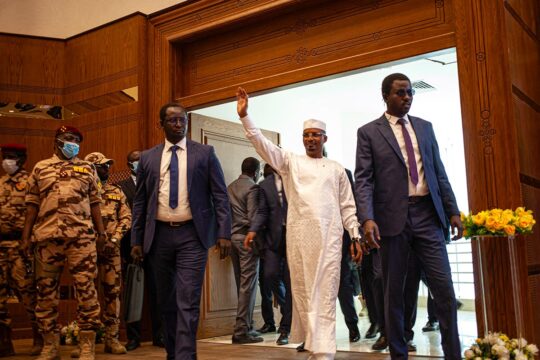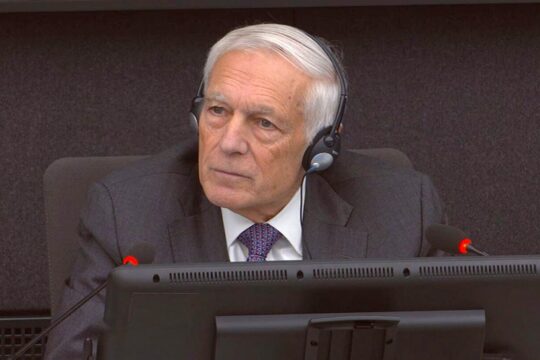“An interminable political and legal soap opera” is how South African Archbishop Desmond Tutu described 25 years of back and forth in the quest to bring former Chadian dictator Hissène Habré (1982-1990) to trial for crimes against humanity. His trial, set to open on July 20, will be the first by an African Union- backed court. It will also be the first time that a former African president is brought to trial in another African country for massive human rights abuses. This is a major turning point in the turbulent history of international justice in Africa.
The story of the hunt for Hissène Habré is a remarkable reflection on a chaotic international justice process that started in the 1990s and in which the quest for justice was mixed with pragmatism and Realpolitik. It also brings up all the questions related to justice without borders in a world where crimes abound and their perpetrators are rarely punished.
A dictator supported by the West
From 1981 to 1989, Habré was a bloody dictator. But he enjoyed the full support of presidents Reagan and Mitterrand, who saw him as a rampart against fiery Libyan leader Colonel Muammar Gaddafi. It was the Cold War years, and according to a saying of the time, Hissène Habré “was a son of a bitch, but he was our son of a bitch”.
His reign of terror left 40,000 victims, according to the Chadian commission of inquiry, but the CIA supported him and armed him massively. Despite the kidnapping of anthropologist Françoise Claustre in 1974 and murder of Captain Pierre Galopin who went in 1975 to negotiate her release, Paris did the same, in order to contain Libyan expansionism in northern Chad.
A mad idea that created a spark
When Habré fell in 1990, a handful of survivors from his prisons, wounded and wanting their dignity back, started to pursue a dream of bringing to justice the man who had broken part of their lives. It was a mad idea in a country that has never been a model of democracy. Souleymane Guengueng discreetly gathered the testimonies of 792 survivors from Habré’s jails and patiently wrote details of their torment by hand on yellowed pages, attaching their photos. The Chadian regime had changed and violence had decreased since former army commander Idriss Deby overthrew Habré in 1990, but the officers in charge of the brutal political police, the DDS, were still there.
An extraordinary conjunction of factors combined to make the survivors’ dream suddenly possible. The Pinochet affair, mobilization of African NGOs, the legal and communications expertise of Human Rights Watch and the International Federation for Human Rights (FIDH), intervention by the United Nations, European Parliament and African Union, and a ruling by the International Court of Justice all combined so that obstacles to a trial were lifted one by one.
The missing piece
In 1999, to everyone’s surprise, former Chilean dictator Augusto Pinochet was arrested in London. It was like a massive thunderclap in international relations. A so far unknown Spanish judge had issued an arrest warrant for Pinochet, who was visiting London, and he was put under house arrest for crimes committed in his country, thousands of kilometres from the UK. This rebirth of the principle of universal jurisdiction, born in earlier times to fight pirates on the High Seas, shocked some, but delighted others. The charge of crimes against humanity, first used in 1945 at the Nuremberg trials, had created a conceptual breach in the so far impenetrable walls of national sovereignty, but there had been a piece missing to enable action. Suddenly, with the Pinochet precedent, the principle of universal jurisdiction was the missing piece. And the time was right with the creation of the International Criminal Court, whose founding treaty was signed in Rome in 1998.
Reed Brody, who followed the Pinochet case for Human Rights Watch, decided to support Souleymane Guengueng and his fellow survivors in their campaign. And so began the real hunt for the man dubbed the “African Pinochet”. Habré put forward two major arguments. He slammed the West for judicial imperialism and for the fact that only he was being pursued while his former army commander in 1983 and 1984, Idriss Deby, is now President of Chad and has not so far been bothered by international justice.
African solutions for African problems
The first legal confrontation took place in Senegal. And it was a strong symbol: A Senegalese court was to try a former Chadian dictator. As the slogan goes, we need “African solutions to African problems”. Senegal was also the first country in the world to ratify the Statutes of the International Criminal Court. It was also to Senegal that Habré fled, taking with him the riches of his country’s national treasury. And so, according to those who accuse him, he used some of this money to pay traditional holy men and many others, to help fund the football club of his Dakar suburb, FC Ouakam, and took a Senegalese woman as a third wife. He also went to the mosque every Friday wearing a white robe, trying to project the image of a humble and pious man. Apparently, this former graduate of Sciences Po (prestigious public research and higher education institution in Paris, France) is quite astute. He took the same legal advisor as the Senegalese president at that time, Abdoulaye Wade, and Wade remained a loyal friend. No doubt the Senegal Supreme Court was aware of that fact when it ruled in 2001 that it did not have jurisdiction to try Habré.
The archives of terror
And then came another twist in the Habré saga. In 2001, accompanied by tenacious HRW lawyer Reed Brody, I got authorization to go into the former headquarters of the DDS to film. To our absolute amazement, once we got into the building, we found ourselves walking on thousands of documents that had been left in an indescribable mess. We were up to our ankles in them, as the film “Dictator Hunter” shows. And these documents were not insignificant, they were the archives documenting a reign of terror, those of the brutal Directorate of Documentation and Security (DDS), Habré’s political police which answered directly to him.
When HRW went through them, we found a list of 1,208 people who had been executed and of another 12,000 victims, with reports of their interrogations and correspondence with allied secret services. It was a turning point for what could follow in the judicial process, because it revealed the architecture of a system of oppression, written by those in charge of it. The first document we gathered was a letter of thanks to the CIA for a training course for DDS agents. All this evidence strengthens the indictment. Why were we allowed to access the former headquarters of the DDS? Was it negligence or because people had forgotten what was there after years of it being abandoned? Or was there another reason? Perhaps we will never know.
Politics always has the last word
After Senegalese courts said they could not try Habré, the Chadian victims and HRW looked for a court that could. At that time Belgium was in the forefront in applying the principle of universal jurisdiction. The legal battle moved to Belgium, and in 2005 investigating magistrate Fransen indicted Habré for crimes against humanity, after four years of investigations. But Belgium’s use of the universal jurisdiction principle got out of hand. More than 15 sitting heads of state were targeted, including Chirac, Clinton, Blair, Castro, Sharon and Arafat. With the US threatening to move NATO headquarters out of Belgium, the Belgian authorities drastically reduced the scope of the universal jurisdiction law. The Hissène Habré case nevertheless survived, especially since some Chadian victims had obtained Belgian nationality. But, despite repeated demands from Brussels, Senegalese authorities refused to hand Habré over, saying they did not have the legal power to do so. Politics always has the last word.
The African Union finally asked Senegal to try the former dictator “in the name of Africa” or extradite him to Belgium, but in vain. In 2009, Belgium took Senegal to the International Court of Justice (ICJ) after Dakar failed to respond to any of its extradition requests for Habré. Various UN bodies and the European Parliament also tried to persuade Senegalese president Wade, who still did not want to hand Habré over. Wade was defeated in elections in 2012, just as the ICJ handed down an unambiguous ruling: Senegal must try Habré “without delay” or hand him over to judicial authorities in Belgium. The new Senegalese president, Macky Sall, announced that Habré would be tried in Dakar by a new court, the Extraordinary African Chambers (EAC). The last political obstacle had thus been removed. Some victims in Senegal bought a white buffalo and sacrificed it, so the gods should remain on their side.
Will US and French role come up in court?
Hissène Habré will thus be tried by an African court, backed by the African Union, at a time when Africa is divided between governments that have asked for International Criminal Court intervention (Uganda, DRC, Mali, Central African Republic, Côte d’Ivoire) and those who say the ICC is judicial imperialism.
Twenty-five years after the hunt for Habré started, the saga is reaching its final chapter in Dakar, after a battle waged in N’djamena, Brussels, New York, Addis Ababa, The Hague, Geneva and Paris. “He who was master of the country, the all-powerful Hissène Habré must answer for his crimes,” Souleymane Guengueng said in 2001 in “Dictator Hunter”. Fourteen years later, after all the ups and downs, Souleymane Guengueng and his friends have finally won. Hissène Habré will finally appear before his judges. Will he break his silence and, if so, what will he say about his military ties with Paris and Washington that used to be so close? What of the very ambiguous attitude of the Chadian government, which officially supports the trial but does not want the current head of State’s name brought up? And there is also another big, unanswered question: will the first universal-jurisdiction trial of a former dictator herald a new era in Africa, or will it remain an exception?






